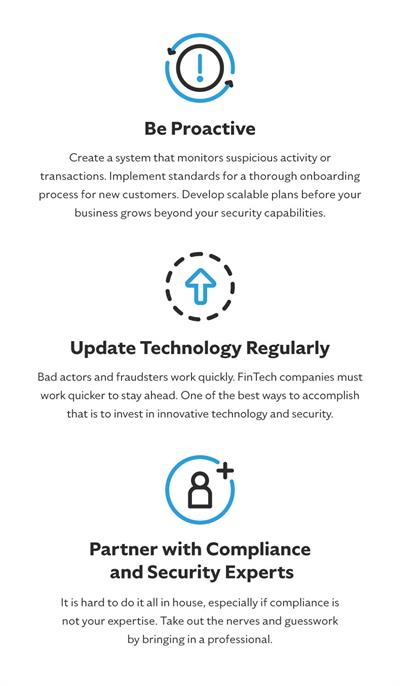Financial Technology (FinTech) institutions are required to comply with special regulatory laws regarding data privacy, consumer safety, money laundering prevention, and cyberattacks.

These laws are designed to protect everyone involved: the consumer, the investor, and the institution itself. Numerous regulatory bodies develop these rules and practices to keep up with the expanding industry, evolving technology, and rate of fraud.
Regulations are regional. The United States has the largest FinTech ecosystem in the world, and as a result, has the more regulations than other regions, like Australia, the United Kingdom, and Western Europe.
FinTech companies have an obligation to understand the rules and regulations for the countries and regions they operate in.
Here is a breakdown of some US regulations:
United States FinTech Regulations
Name: Securities Act of 1933
Also Known As: The Truth in Securities Act, The Federal Securities Act
Year Enacted: 1933
Issue: Fraud Prevention, Consumer Protection
Description: Financial institutions must provide investors with information about securities being offered for public sale.
Name: Truth in Lending Act (TILA)
Year Enacted: 1968
Associated Regulatory Bodies: Federal Trade Commission (FTC), Office of the Comptroller of Currency (OCC)
Issue: Consumer Protection
Description: Lenders and creditors must provide consumers with certain written disclosures on loan cost, finance charges, and related aspects of credit transactions, such as annual percentage rates.
Name: Bank Secrecy Act (BSA)
Also Known As: The Currency and Foreign Transactions Reporting Act
Year Enacted: 1970
Associated Regulatory Body: The Office of the Comptroller of Currency (OCC)
Issue: Anti-Money Laundering
Description: Financial institutions must assist the United States government in detecting and preventing money laundering. This regulation establishes program, recordkeeping and reporting requirements for national banks, federal savings associations, federal branches and agencies or foreign banks.
Name: Fair Credit Reporting Act (FCRA)
Year Enacted: 1970
Associated Regulatory Body: Federal Trade Commission (FTC)
Issue: Consumer Protection
Description: Regulatory bodies protect the information collected by consumers reporting agencies such as credit bureaus, medical information companies, and tenant screening services. Only those with a purpose specified by the FCRA can access these consumer reports. Companies that provide information to consumer reporting agencies must comply with legal obligations, including the duty to investigate disputed information, and notify consumers when an adverse action is taken based on consumer reports.
Name: Equal Credit Opportunity Act (ECOA)
Year Enacted: 1974
Associated Regulatory Body: Federal Trade Commission (FTC)
Issue: Consumer Protection
Description: Financial institutions are prohibited to discriminate on the basis of race, color, religion, national origin, sex, marital status, age, receipt of public assistance, or good faith exercise of any rights under the Consumer Credit Protection Act. Creditors must provide applicants, upon request, with the reasons underlying decisions to deny credit.
Name: Electronic Fund Transfer Act (EFTA)
Year Enacted: 1978
Associated Regulatory Body: Federal Trade Commission (FTC)
Issue: Consumer Protection
Description: Financial institutions must adopt certain practices regarding transaction accounting and error resolution. They must also have procedures for preauthorized transfers and set liability limits for losses caused by unauthorized transfers.
Name: Truth in Saving Act (TISA)
Also Known As: Federal Deposit Insurance Corporation Improvement Act of 1991, Foreign Bank Supervision Enhancement Act of 1991
Year Enacted: 1991
Issue: Consumer Protection
Description: Financial institutions must provide consumers with disclosures about the terms and costs of deposit accounts, such as saving accounts, checking accounts, money market accounts and more.
Name: Gramm-Leach-Bliley Act (GLBA)
Also Known As: Financial Services Modernization Act of 1999
Year Enacted: 1999
Associated Regulatory Body: Federal Trade Commission (FTC)
Issue: Consumer Protection
Description: Financial institutions must explain their information-sharing practices to their customers and safeguard sensitive data.
Name: Electronic Signatures in Global and National Commerce Act (ESIGN)
Also Known As: E-Sign Act
Year Enacted: 2000
Associated Regulatory Body: National Credit Union Administration (NCUA)
Issue: Consumer Safety, Fraud Prevention
Description: Financial institutions may use electronic records to satisfy any statue, regulation, or rule of law requiring that the information be provided in writing, if the consumer has consented to such use and has not withdrawn consent.
Name: USA PATRIOT Act
Also Known As: Uniting and Strengthening America by Providing Appropriate Tools Required to Intercept and Obstruct Terrorism (USA PATRIOT) Act of 2001.
Year Enacted: 2001
Associated Regulatory Body: Financial Crime Enforcement Network (FinCen)
Issue: Anti Money Laundering, Financial Terrorism
Description: US banking institutions must perform enhanced customer due diligence to prevent the fraudulent creation of bank accounts with fabricated identification numbers, and report suspected money laundering to the US government to prevent acts of terror. The regulation was enacted in response to the terrorist attacks of September 11, 2001.
Name: Red Flag Rule
Also Known As: Sometimes referred to as one of the Fair Credit Reporting Act’s Identity theft Rules.
Year Enacted: 2008
Associated Regulatory Body: Federal Trade Commission (FTC)
Issue(s): Identity Theft, Consumer Protection
Description: Businesses and organizations must implement a written Identity Theft Prevention Program designed to detect the warning signs — or red flags — of identity theft in their day-to-day operations.
Name: Jumpstart Our Business Startups Act (JOBS)
Also Known As: JOBS Act, CROWDFUND Act
Year Enacted: 2012
Associated Regulatory Body: US Securities and Exchange Commission (SEC)
Description: This law eased security regulations to allow companies to use crowdfunding to issue securities.
Name: Anti Money Laundering Act (AMLA)
Year Enacted: 2020
Associated Regulatory Body: Financial Crimes Enforcement Network (FinCen)
Issue: Anti Money Laundering
Description: The Treasury Department must set forth policies and regulations to protect against money laundering and terrorist financing compelling organizations to develop and adhere to risk-based anti-money laundering (AML) compliance programs.
Staying Safe Beyond Compliance
 There is no need to stop your work at mere compliance. The best FinTech brands go beyond regulations to ensure safety and peace of mind.
There is no need to stop your work at mere compliance. The best FinTech brands go beyond regulations to ensure safety and peace of mind.
Be proactive.
Invest in a system that eliminates fraud at the source, before it bites your business, customers, or investors.
Partner with compliance and security experts.
EVS has fifteen plus years of security and compliance experience. To learn more about what we can do for you, visit our website, or contact us for a consultation.
